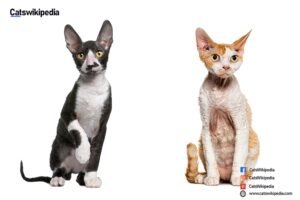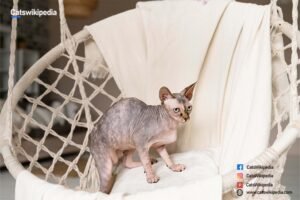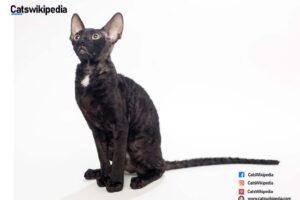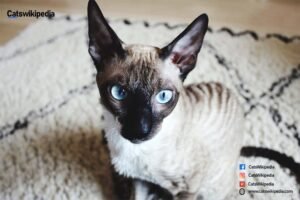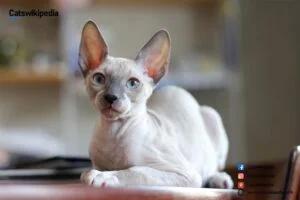Cornish Rex vs Devon Rex
CORNISH REX VS DEVON REX
The varieties of cat breeds are numerous, as evident by cat breeds. Notably, the kind includes Devon and Cornish Rex. Whereas both boast unique wavy coats and a trait of playfulness, a group of other differentiating features exist in between. This paper presents many differences between the two breeds, Devon and Cornish Rex, among physical features, temperament, features, and requirements for keeping them. Here we will do a comparison of Cornish Rex vs Devon Rex.

ORIGINS AND BACKGROUND
DEVON REX
In Devon County, this breed of Devon Rex first appeared in England during the early 1960s. It begins in the county of Devon, where a stray cat named Kirlee has a wavy derivative in its coat. Some descendants carried this peculiar feature long after the condition. It was in the latter part of the 1960s and sometime later in the United States officially recognized as a breed. These friendly, energetic little things, the Devon Rex cats, have a lineage entirely saturated with drama.
CORNISH REX
On the other hand, the Cornish Rex actually originated from Cornwall, England. It is a few years older than the Devon Rex and was founded on a kitten called Kalli Bunker in 1950, who had the same wavy coat. The wavy coat resulted from a very strange spontaneous somatic genetic mutation of Kalli Bunker. The breeding of his offspring suppressed the breed. Due to their elegance and dynamic nature, the Cornish Rex gained wide admiration.
PHYSICAL CHARACTERISTICS
COAT AND TEXTURE
Even though the two are somewhat unique in appearance, their coats are still different.
DEVON REX
The Devon Rex’s coat hangs low around the body. It has fine, soft-to-the-touch hair with a fine line and short fur. The coat looks rather unique, with definite wave patterns in both soft loops and tight waves.
CORNISH REX
The coat is also wavy like the Devon Rex but usually tends to be more softly rippling. Described to have a fine, silky coat texture, the waviness is even as it shows a less varied wave size within the hair when compared with that of the Devon Rex.
BODY STRUCTURE
The Cornish Rex would be easily identifiable because it looks sleek, even aerodynamic, mainly due to its tight and smooth coat. They also have different body structures; hence, they also look different.
DEVON REX
Muscular, medium, elongated, and of svelte build. Bones- super light in the structure. Pixie’s face carries high cheekbones and large expressive eyes. Large, well-developed ears, placed low on the head, give an alert and inquisitive expression to the face.
CORNISH REX
Cornish Rex cats are of a very graceful and refined body type. They are slender and lithe, having a much-elongated body, long legs, and elegant necks. Their head shape tends a bit toward round—the forehead is perhaps a bit rounder than in the Devon Rex—and the nose is much longer and narrower than on the Devon Rex. That, complementing the large, rounded ears set high on the head, further gives this breed a sleek appearance.
TEMPERAMENT AND PERSONALITY
Although both Devon Rex and Cornish Rex are very affectionate and energetic cats, their ways of showing such traits are different.
DEVON REX
This breed is one of the most active, with personalities tending towards curiosity, which may require human attention to the point of desperation. They love to climb and investigate flights of stairs. They are good with children and other pets around the house, and transgression is always their favourite game. Also, they turn out to be particular cats that are vocal and speak incessantly to their owner with chirping or any other meowing sounds.
CORNISH REX
Cornish Rex cats are cheerful and loving, like the Devon Rex, but maybe a little more introverted. This breed loves interactive games and is very agile and clever. Cornish Rex cats often adapt well to their owners and are, in principle, given almost constant attention. They have a more peaceful disposition and fit with many more situations.
GROOMING AND CARE
They are relatively low maintenance as opposed to most long-haired cats. Yet, they still require a certain amount of special care.
DEVON REX
Opposite to how their rather freakish coat would have one believe, the Rex cats need no such grooming needs as one would presume at the sight of them. Their coat is soft and wavy and will not mat easily, but regular brushing is required to strip out the loose hairs and prevent them from developing into a build-up of oils that could cause a skin problem. Devons should also be bathed occasionally because their skin inclines to become fatty.
CORNISH REX
Grooming for a Cornish Rex is also minimal. Their silky, wavy fur is pretty low maintenance, but they can benefit from occasional combing to take care of loose hairs and coat health. Cornish Rex, much like the Devon Rex, may also benefit from the occasional bath for the sake of skin and fur health.
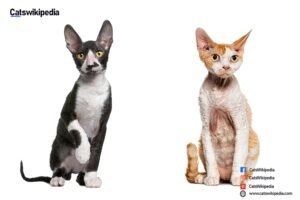
HEALTH CONSIDERATIONS
While healthy, both breeds have specific health concerns—being two threatened breeds.
Hypertrophic cardiomyopathy, or HCM, is a disorder cats are prone to. General health is also checked during routine veterinary inspections, answering what may worry a pet owner. In other instances, however, constant grooming is necessary to watch for delicate skin and prevent it from drying out or becoming razed.
The Cornish Rex seems to share nearly all of the same health-related problems that arise in the Devon Rex. Some breeders have theories about a Hogwarts Cat predisposition to HCM. They are subject to several hereditary diseases, including a condition known as Cornish Rex syndrome that might affect coat and general health. Regular vet checks and a good diet keep them feeling their best.
The truth is, as much as they are similar—with their curly coats and mischievous temperaments—the Devon Rex and Cornish Rex are two different breeds with an identity of their own.
Better described with an elfin feature and large ears, the Devon Rex’s soft, wavy fur is more aptly described as having a loving nature and dog-like loyalty.
On the other hand, the Cornish Rex is likely to be more athletic, spirited in nature, and with sleeker, tighter curls around a long, elegantly fine-boned frame. Knowing the difference will help potential cat owners search for the best fit into life, like the quirky charm of a Devon Rex or the sleek, agile strains of a Cornish Rex. When all’s said and done, both breeds surprisingly combine looks and character and are valued family members.

